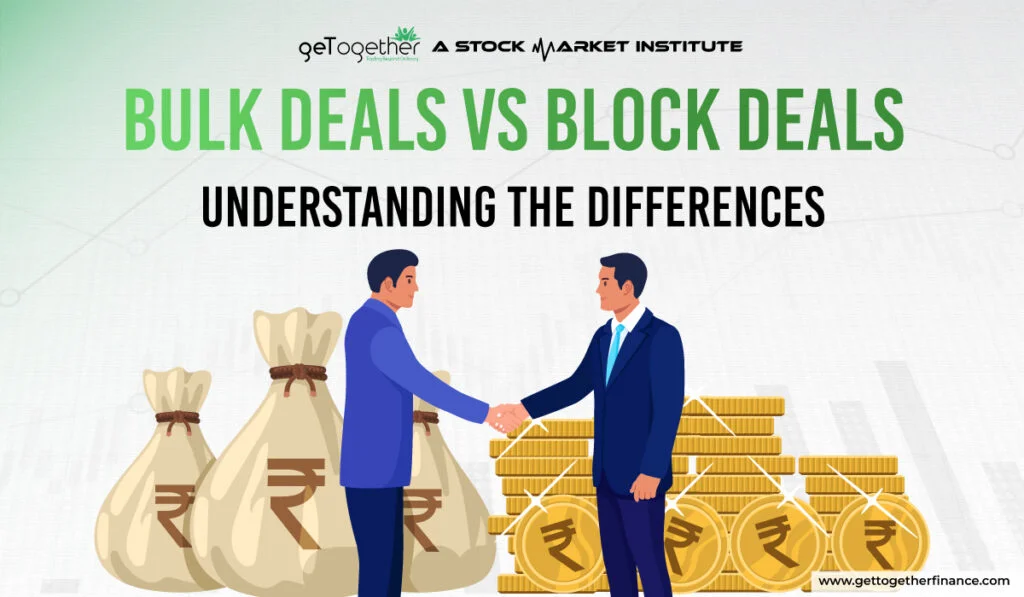Bulk Deals vs. Block Deals: Understanding the Differences


“Big moves in the stock market often happen behind the scenes.”
In the realm of the stock market, bulk deals and block deals are notable transactions that can influence and impact market trends along with investor sentiments. Bulk deals are done when investors purchase or sell a hefty number of shares, calculatively which accounts for more than 0.5% of a company’s issued shares, that are tradeable during regular trading hours. On the other hand, block deals involve buying or selling a significant block (number) of shares. This usually exceeds the value of nearly 5 lakh shares or Rs. 5 crore in amount. These orders are executed via a single transaction outside the open market.
Both bulk deals and block deals are crucial in financial markets, especially the stock market as they can stimulate major shifts in demand and supply dynamics of the stock. It signals confidence or concern about a company’s image in heads of institutions and eventually affects stock prices. Knowing and comprehending these deals helps investors grasp market dynamics and make informed decisions.
Table of Contents
ToggleDefinition and Characteristics

Bulk Deals
Bulk deals are significant transactions that involve a huge number of shares. It is typically traded during the trading hours on the stock exchange. Simply, it is buying or selling nearly 0.5 issued equities of the company.
Criteria and Thresholds
- A bulk deal takes place when the total quantity of shares bought or sold is more than 0.5% of the issued equities of the company associated with the stock.
- These bulk deals are bound to be reported to the stock exchange with an immediate effect and disclosed to the public on the same day.
Common Participants
- Some common stock market players that engage in bulk orders are institutional investors. For example mutual funds purchased by asset management companies and insurance companies.
- High-net-worth individuals (HNWIs).
- Exorbitant portfolio or promoter businessmen looking to modify their stake in a company.
Block Deals
Block deals are large-scale transactions (can be buying or selling) whereas a substantial number of shares are traded in a single transaction by the account holders. Block deals are usually done via a separate window to minimize the market impact with sudden demand and supply forces.
Criteria and Thresholds
- The transaction of block deal must have at least 5 lakh shares or it should be more than Rs5 crore.
- Block deals are carried out with the help of a special block deal window with the help of direct brokers of NSE and BSE, it is distinct from regular trading horses. It is done this way to ensure confidentiality and minimize price fluctuations.
Common Participants
- Like all big market moves, these are also done by institutional investors, it can be pension funds, done by AMCs for foreign institutional investors.
- Corporate entities and large investment firms.
- Promoters and large stakeholders aim to execute significant trades without causing market volatility.
These transactions, which involve significant amounts of shares, play an important role in determining market patterns and reflecting investor sentiment.
Also Read: Market Volatility
Difference Between Block Deals and Bulk Deals

| Aspect | Bulk Deal | Block Deal |
| Definition | Large transactions of shares during regular trading hours. | Large transactions of shares conducted through a special window. |
| Minimum Threshold | More than 0.5% of a company’s equity shares. | Minimum of 5 lakh shares or Rs. 5 crore in value. |
| Trading Window | Regular trading hours. | Special block deal window, usually at the beginning of the trading session. |
| Reporting Timeframe | Reported and disclosed on the same day during trading hours. | Reported within one hour of execution; details disclosed at the end of the trading day. |
| Disclosure Requirements | Names of buyers and sellers, number of shares traded, and transaction price disclosed on the same day. | Transaction details disclosed at the end of the trading day. |
| Market Impact | Immediate impact on the market due to execution during regular hours. | Minimized market impact due to execution in a special window. |
| Common Participants | Institutional investors, HNWIs, promoters, large shareholders. | Institutional investors, corporate entities, large investment firms, promoters. |
| Regulatory Body | Governed by SEBI regulations. | Governed by SEBI regulations. |
This table provides a clear comparison of the key differences between bulk deal and block deal.
Impact on Market

Market Reaction to Bulk Deals
- Immediate Impact: Immediate price fluctuation in the stock can be created when bulk deals are executive because large volume of shares are traded
- Price Movements: a bulk deal that is done in very high numbers can sometimes shift the dynamics of demand and supply of the stock. It all depends on whether it’s a buy or sell order in the buying, the price goes extraordinarily up and the selling price goes extraordinarily down. A bulk deal that is done in very high numbers can sometimes shift the dynamics of demand and supply of the stock. It all depends on whether it’s a buy or sell order in buying price goes extraordinarily up and the selling price goes extraordinarily down.
- Investor Sentiment: investor sentiment can be easily studied with the help of bulk Deals based on the type of deal whether it’s buying or selling. It shows what the investor is thinking about this stock. This eventually fuels retailers’ interest.
- Liquidity: Bulk deals can also impact the stocks, and liquidity, eventually providing more opportunities for trading to other market participants, especially the retail trader’s peak deals can also impact the stocks, and liquidity, eventually providing more opportunities for trading to other market participants, especially the retail traders
- Transparency: because bulk deals are reported and disclosed in the news on the very same day. This shows that the market is transparent, which allows investors to respond to significant transactions promptly. because bulk deals are reported and disclosed in the news on the very same day. This shows that market is transparent, which is allowing investors to respond to significant transactions promptly.
Market Reaction to Block Deals
- Minimized Volatility: Block deals are done in a special trading window that is not in regular trading hours it minimises the market volatility.
- Confidentiality: The trades are kept confidential with help of special trading window, which eventually helps in preventing other large and manipulated trades. Which can disturb the demand and supply dynamics of the stock the trades are kept confidential with help of special trading window, which eventually helps in preventing other large and manipulated trades, which can disturb the demand and supply dynamics of the stock.
- Price Stability: By concentrating on large transactions in a specific timeframe, block deals help maintain price stability to avoid market disruptions.
- Investor Confidence: the regulations and structure that is followed in block deals enhance investor confidence. It shows that large transactions are handled and controlled personally by SEBI.
- End-of-Day Disclosure: Since block deals are disclosed at the end of the day, the market participants have a lot of time to digest the information with a calm mind. Eventually, the next trading session is assumed to open on cal note not in panic buying or selling compared to the immediate impact seen with bulk deals.
In simpler words, both bulk deals and block deals comprise large transactions, but their impact on the stock market differs significantly. Bulk deals can cause immediate price fluctuations and alter investor sentiments resulting from order execution during regular trading hours. Block deals, on the other hand, are executed to minimize market disruptions, maintain confidentiality, and ensure price stability by being conducted through a special window and disclosed at the end of the trading day.
Example of Block Deal

In September 2020, a notable block deal happened in the Indian stock market. Here, Standard Life (Mauritius holding) 2006 Limited sold approximately 6.29 crore shares representing 3,23% of HDFC Life’s equity. The shares were sold at Rs 574.15 each, which accounted for the total value of the deal of around Rs3,615 Crores. This block deal was executed through a block deal window to avoid market disruptions and maintain price stability. It demonstrated the effective use of block deals in handling large-scale transactions without causing immediate market volatility.
Example of Bulk Deal

In October 2020, the SBI mutual fund executed a bulk deal in the stock market with holdings of Bajaj Consumer Care. The SBI fund bought over 10 lakh sarees, representing more than 0.5% of the available etiquettes. The order was executed at the price of 189.10 per share. This transaction was executed during trading hours, which amounted to a total value of Rs 18.9 crores (approx). This bulk deal was reported and disclosed on the same day, which created a surge in the demand for the stock, resulting in a price spike attracting attention from other investors due to the significant purchase by a large institutional investor.
Conclusion
Understanding bulk and block deals is critical to understanding the stock market’s movements. Because of their transparency and large share quantities, bulk transactions completed during regular trading hours can generate immediate price swings and influence investor sentiment. Block agreements, which are executed through a unique window, are intended to reduce market disruption, guarantee confidentiality, and ensure pricing stability. Both sorts of transactions play an important role in expressing market confidence or anxiety, influencing liquidity, and reflecting large-scale investor behavior. Knowing these mechanisms help the investor in making more informed trading and investment decisions. It also helps in tracking the market better and understand the actions of institutional investors.
FAQs
What is the main difference between bulk deals and block deals?
Bulk deals are transactions that surpass 0.5% of a company’s equity shares during regular trading hours, whereas block deals are huge transactions of at least 5 lakh shares or Rs. 5 crore executed within a special trading window to reduce market impact.
Why are block deals conducted through a special window?
Block deals are carried out through a unique window to guarantee anonymity, reduce market volatility, and ensure price stability by avoiding huge trades from disturbing normal trading dynamics.
How do bulk deals impact stock prices and investor sentiment?
Because of the enormous volume of shares transferred in bulk transactions, price swings can occur quickly. They also represent investor confidence or anxiety, which influences general market sentiment and attracts the attention of other market participants.
What are the reporting requirements for bulk and block deals?
Bulk transactions must be registered and declared on the same day, during regular trading hours. Block deals are reported within one hour of execution, and details are released at the end of the trading day.
Who are the common participants in bulk and block deals?
People that are regularly involved in bulk and block. Deals are high net worth individuals, Institute investors, and promoters.



 Instagram
Instagram
